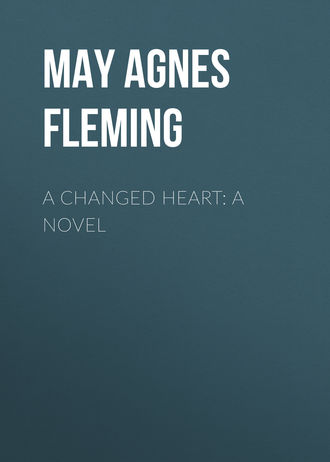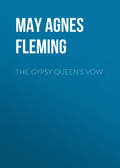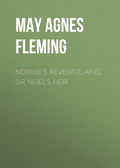
May Agnes Fleming
A Changed Heart: A Novel
"My dear old Val," he cried, slapping him on the shoulder, "I have not lost my senses; so there is no need of that look. I should like to have a tall wife – small men always do, you know – with black eyes and two hundred thousand dollars; and I shall enter the lists with this fascinating Captain Cavendish, and bear off the prize if I can, in spite of his sword, and uniform, and handsome face. I think, on the whole, I shall make the young lady quite as good a husband as he."
"Well," said Mr. Blake, drawing a long breath, and appealing to the deep, "for cool impudence and self-conceit, Paul Wyndham hasn't his match in broad America. Here he comes from New York; and before he is a week in the place he talks of marrying the richest and handsomest girl it contains, as coolly as if he were Sultan of all Turkey, and she a Circassian slave. Yes, Mr. Wyndham, ask her, by all means, and when you get your conge, let me know – it will be one of the happiest days of my life."
"But I don't think I shall get my conge" persisted Paul Wyndham. "Do you know if she is in love with this Captain Cavendish?"
"I never asked her," responded Mr. Blake. "I leave that for Mr. Wyndham to ascertain."
"Because I don't think she is," went on his friend. "When she stood here a few minutes ago, you and the other young lady, Miss – what's her name? – were talking of the gallant captain, and she listened with a face of perfect indifference. I was watching her, and I don't think she cares about him."
"I saw you watching her," said Val, "and so did she, and I don't think she liked it. I saw those black brows of hers contract once or twice, and that is an ominous sign with Miss Henderson."
"Miss Henderson could fly into a dickens of a passion, too, if she liked. Your black-eyed, black-haired, brown-skinned women raise the very old diable herself, if you stroke them the wrong way. They are something like big black cats. I tell you, Blake, I don't believe she cares about that military popinjay, Cavendish."
"Don't you," said Mr. Blake, with his hands in his pockets. "Of course, if you say so it must be so."
"No; but I really think so. Are his family anything in England?"
"It is currently believed he is next heir to a baronetcy. But the baronet got married in his old days, and there is a little shaver in petticoats to cut Master George out. Still, he lives in hope. The new baronet has the measles and the mumps, and the whooping-cough, and the scarlatina, and the chicken-pox, and a tribe of other diseases, his teeth included, to struggle through, before he reaches man's estate. There is no telling but Cavendish may be a baronet yet."
"That is it, then!" said Wyndham. "It is for his prospective baronetcy the girl has promised to marry him. Pride and ambition, the two sins that hurled Lucifer from heaven to hell, are strong in that woman."
"Oh, come now," said Val, starting up, "I think we had better get out of this, and drop the subject. It strikes me your language is rather forcible, Mr. Wyndham; and there is no telling what you may work yourself up to, if you keep on. It wouldn't be healthy for you, I'm thinking, if Miss Henderson heard you."
"Nevertheless," Paul Wyndham persisted, flinging away his smoked-out weed, "I shall marry Miss Henderson."
The two friends walked away together to the office in Queen Street – Mr. Blake disdaining all reply to the last remark.
On their way they met Captain Cavendish, mounted on his favorite bay, and looking the very beau ideal of a military rider, slowly cantering beside the pretty pony-carriage where the Princess of Speckport sat in state. The contrast between the handsome officer on horseback and the young author on foot was great; but Mr. Wyndham bowed to the soldier and his fair friends with undisturbed placidity.
"You see!" said Mr. Blake, significantly.
"I see," serenely answered Mr. Wyndham; "and I repeat. I shall marry Miss Olive Henderson!"
There was nothing at all of boasting in the tone of Mr. Paul Wyndham in saying this – simply one of deep, quiet determination. You had only to look at his face – that pale, steadfast face – if you were any judge of physiognomy, to perceive that his assurance to Mr. Blake, of seldom failing in any undertaking, was no idle bravado. He was one of those men of iron inflexibility, of invincible daring, of over mastering strength of will, bending all other wills to their own. Men of the Napoleon Bonaparte stamp, made to sway empires, and move about other men, kings and knights, queens and bishops, as they please, on the great chessboard of life. Mr. Val Blake, knowing Paul Wyndham, had some dim perception of this; but he knew, too, that Olive Henderson was no ordinary woman. He had a strong will, and so had she; but it was only a woman's will after all, and with it went womanly weakness, passion, and impulse, and the calm, passionless man was the master-mind.
"But I think she will baffle him here, after all," Mr. Blake said to himself, as he ceased thinking about the matter. "I don't believe Olive Henderson will ever marry Paul Wyndham, not but what he's a great deal better fellow than Cavendish, after all!"
It seemed as though he was right, for a whole week passed before Mr. Wyndham and Miss Henderson met again. The engagement of the heiress with Captain Cavendish, though not formally announced, was pretty generally known; and it was rumored that the wedding was to take place early in June. May had come in, draped in a sodden sheet of gray wet fog; but the villa at Redmon went steadily up, despite of wind and weather. Landscape-gardeners were turning the potato-patches and broad meadows and turnip-fields into a little heaven below, and the place was to be completed in July, when Mrs. Grundy said the happy pair would be returning from their bridal-tour, and take up their abode therein.
Mr. Paul Wyndham heard all this as he smoked his cigars and wrote away placidly at his new novel, and was in nowise disturbed. Mr. Val Blake heard it, and grinned as he thought of the egotistical young author getting baffled for once. Miss Henderson's innumerable admirers heard it, and gnashed their teeth with impotent, jealous fury, and, lastly, Miss Henderson herself heard it, and frowned and laughed alternately.
"This horrid gossiping town of yours, Laura!" she said impatiently; "how do they find out everything as soon as one knows it one's self, I wonder! I wish people would mind their own business and let me alone!"
"Great people must pay the penalty of greatness, my dear," Miss Blair answered, philosophically; "and, besides, it is only a question of time, so don't get into a gale about it! It doesn't matter much whether it is known this minute or the next."
The conversation between the young ladies took place in Miss Henderson's room, and while dressing for a ball. It was to be a very grand ball indeed, given by the officers, and to which only the tiptop cream of the cream of Speckport society was to be invited. Of course Miss Henderson was the first lady thought of, and of course her friend Miss Blair came next; but Mr. Val Blake, who didn't belong to the crême at all, was to be there too. But Mr. Blake was such a good fellow, and hand and glove with the whole barracks, and was so useful to puff their concerts and theatricals in the "Spouter," and praise the bass of Lieutenant the Honorable L. H. Blank, and the tenor-solo of Captain G. P. Cavendish, etc., etc., that it would have been an unpardonable breach to have omitted him. Mr. Paul Wyndham, whose fame as an author had by this time reached Speckport, was also to be there; and the ball was expected to be the most brilliant thing of the season.
As far as weather went, it was rather a failure already. The dismal, clammy fog had subsided at last into rain, and the rain lashed the windows of Miss Henderson's room, and the wind shrieked about the cottage, and roared out at sea as if bent on making a night of it. The heiress, with Rosie, the maid, putting the finishing touches to her toilette, stood listening to the storm, and drearily watching the reflection of her own face and figure in the tall glass. She had taken a fancy to be grandly somber to-night, and wore black velvet and the diamonds Speckport talked so much of, ablaze on throat and arms. There were blood-red flowers in her tar-black hair, and in her bouquet which lay on the dressing table, but she looked more superb in her sable splendor than ever.
Was Miss Laura Blair, with her commonplace prettiness of fair skin, pink cheeks, and waving brown hair, laying herself out as a foil to the black-eyed siren? She was dressed in white moire antique, gemmed with seed-pearls, and with a train of richness that swept half way across the room. She had white roses in her hair, on her breast, and in her bouquet. She wore pearl bracelets and necklace, and looked fair as a lily – a vivid contrast to her black and crimson neighbor.
Miss Henderson sent Rosie out of the room, and stood listening in silence for a while to the raging of the storm. Presently she turned to Laura, who was all absorbed settling her laces and jewels, with a rather singular inquiry on her lips.
"Laura," she said, abruptly, "what is the matter with me to-night? Why am I afraid to go to the ball?" Miss Blair turned round and gazed aghast at this question. The shadow that sometimes lay on her friend's face was there now, like a dark vail.
"Dear me, Olly! I'm sure I don't know what you mean! Afraid to go to the ball?"
"Yes," repeated Olive, "afraid! I feel as though something were going to happen! I have a presentiment that some misfortune is before me! I have had it all day!"
"It's the weather, dear," said Laura, retiring to the toilet, "or else it's indigestion. Don't be foolish!"
Olive Henderson was in no laughing humor, but she did laugh, half fretfully, though, at this reply. "It's not the weather, and it's not the indigestion, Miss Blair," she said, "it is the moral barometer giving warning of a coming storm – it is coming events casting their shadows before. I have half a mind not to go to the ball to-night."
"Nonsense, Olly!" exclaimed Laura, in some alarm, knowing very well Olive was just the girl not to go if she took it in her head, "how absurd you are. Presentiments! pooh! You've been reading some German trash – that's what you've been doing, and you have caught some absurd German silliness! I should like to see you try to stay away from the ball, the last, the best, the brightest of the season, and you looking divine, too, in that black velvet! What could possibly happen you at the ball, I should like to know?"
Miss Henderson and Miss Blair were rather late in arriving – nearly every one was there before them. There were two gentlemen who came considerably late, but no one noticed them much, being only Mr. Val Blake and his New York friend, Mr. Paul Wyndham. Mr. Blake was fond of dancing, and was captured by Miss Blair almost as soon as he entered, and led off; for Miss Laura did make love to this big stupid Val in pretty roundabout feminine fashion, as women have a way of doing all the world over. Mr. Wyndham did not dance, and as he was not at liberty to smoke, the ball was rather a bore than otherwise. He stood leaning against a pillar, watching the dancers; his pale, grave, quiet face and thoughtful gray eyes ever turned in one direction. A great many more gentlemen's faces turned presently in the same quarter, for the loadstone of the ball shone there, magnificent, in black velvet, and with eyes that outshone her diamonds. Was there rapport between them? Was it some inward magnetism that made the belle of the ball, in the height of her triumph and power, aware of this fixed, steadfast gaze, and uneasy under it? Flatterers and sycophants surrounded her on every hand, but she had to turn restlessly away from them and look over every now and then to that pale, watchful face, and those fixed, grave gray eyes.
Paul Wyndham still watched her. She grew nervously miserable at last, and enraged with herself for becoming so. If this strange man stared rudely, what was it to her? She would take no further notice of him, she would not look at him; and saying this to herself, she floated away in the waltz, with her eyes persistently fixed on her partner or on the floor.
The waltz concluded, and Miss Henderson, being tired and hot, her partner led her to a seat, and left her to get an ice. It was the first time all that evening she had been for a moment alone, and she lay back among the cushions of her chair and listened to the raging of the storm without.
The seat was in the recess of a bay window, partly shut out from the room by scarlet drapery, and she was glad to think she was alone. Alone! No, for there opposite to her stood Paul Wyndham, his magnetic eyes fixed with powerful intensity on her face. A cold thrill of fear, vague and chilling, crept through every vein – she would have risen, in undefined panic, but he was by her side directly, speaking quietly the commonest of commonplace words.
"Good evening, Miss Henderson. I trust I see you well and enjoying yourself. It is the first time I have had the pleasure of approaching you, you have been so surrounded all the evening."
She did not speak; a cold bend of the head answered him, and she rose up, haughty and pale. But he would not let her go; the power of his fixed gaze held her there as surely as if she had been chained.
"I fear," he said, in that quiet voice of his, "I fear you thought me rude in watching you, as I must own to having done. But I assure you, Miss Henderson, it was no intentional rudeness; neither was it my admiration, which, pardon me, is great! I watched, Miss Henderson, because I find you bear a most startling, a most wonderful resemblance to a person – a young girl – I once knew in New York."
She caught her breath, feeling the blood leaving her face, and herself growing cold. Paul Wyndham never took his pitiless eyes off her charming face.
"In saying I knew this young girl," he slowly went on, "I am wrong; I only saw her in the city streets. You came from New York, but you could not have known her, Miss Henderson, for she was abjectly poor. She lived in a mean and dirty thoroughfare called Minetta Street; she lodged in a house filled with rough factory-women, and kept by one Mrs. Butterby; and the young woman's name was Harriet Wade."
A moment after Mr. Wyndham said this, he came out of the curtained recess, and crossed the ballroom rapidly. On his way he met Laura Blair, and paused to speak.
"I am going for a glass of water," he said, "for Miss Henderson. I was talking to her at that window when she was taken suddenly ill. You had better go to her, Miss Blair. I am afraid she is going to faint."
CHAPTER XXVII.
MR. WYNDHAM'S WOOING
A bleak and rainy morning in Speckport – a raw and windy morning, with a sky all lead-color, except where it was inky black. A wild, wet, rainy day, on which nobody wanted to stir out if they could help it. An utterly black and miserable day, that which followed the officers' ball.
On this wretchedly wet and windy day Olive Henderson sat at her chamber window, and looked out over the black and foam-crested bay. The room looked very cozy and pleasant, with its soft, warm, bright-hued Brussels carpet, its cushioned easy-chairs and lounges, its white-draped bed, its pretty pictures and tables, and bright coal fire burning in the glittering steel grate, its costly window-draperies of lace and damask, looking all the more pleasant and luxurious by contrast with the black, bleak day outside.
A delightful room this bad May morning, a room to bask and luxuriate in, this chamber of Olive Henderson. But Olive Henderson herself, sitting by the window, staring blankly out, seemed to take very little enjoyment in its comfort and beauty. She wore a white loose muslin wrapper, tied carelessly round the slender waist with a crimson cord, its every fold, as it hung straight about her, telling how indifferently the simple toilette had been made. All her profuse black hair was drawn away from her face, haggard and worn in the gray morning light, and fastened in a great careless knot behind. But, somehow, the stateliness that was a part of herself characterized her as strikingly in this primitive simplicity as when robed in velvet and diamonds last night. Perhaps Semiramis, Queen of Assyria, when in trouble with foreign parts, wore white muslin wrappers, and her black hair disheveled, before her subjects, and managed to look Queen Semiramis withal. It isn't likely, you know, but she may.
Rain, rain, rain! How ceaselessly it lashed the windows, and how piteously it beat on the heads of the poor little newsboys, passing up and down Golden Row, and chanting, disconsolately, "Morning Snorter," the "Sn-o-o-or-ter!" Perhaps, looking up at the curtained-window, where the young lady sat, these newsboys thought it was a fine thing to be Miss Olive Henderson, the heiress of Redmon, and live in a handsome house, with servants to wait on her, and nothing to do but play the piano, and drive about in her carriage all day long. But, I am pretty sure, there was not a pug-nosed urchin coming there that particular morning, who was not a thousand times happier than the heiress of Redmon.
Discovered – disgraced – in the power of this man – this stranger! Liable to be exposed as a liar and a cheat to the world at any hour! Liable to have all this wealth and luxury, for which she had done so much – for which she had risked her very soul – torn from her at any instant, and she herself thrust out to fight the battle of life, with poverty and labor and misery once more. She seemed to have grown old in four-and-twenty hours, with her haggard cheeks and great hollow eyes. She had sat as she was sitting now for hours, her hands clasped loosely in her lap, her vacant gaze fixed on the wretched day, but seeing nothing. Only yesterday, and she had been so sure, so secure, so happy, and now – and now!
She had not fainted the night before. Laura Blair found her lying back ghastly and white in her chair, but not insensible. The ballroom had been filled with consternation, and she was so surrounded immediately that Mr. Wyndham, returning with his glass of water, could find no possibility of approaching her. They had led her into the ladies' dressing-room, and Captain Cavendish had gone for a cab; and when she was a little better, they took her home, and the rest went back to the ballroom. People began to think that in spite of Miss Henderson's apparent physical perfection, she was subject to fainting fits, and pitied her very much, as they resumed their dancing. But the eclipsed belles of Speckport rejoiced, I am afraid, in their wicked little hearts, that the conqueress was gone, and held up their pretty heads, which had drooped in the sunlight of her shining presence before.
Once at home, Miss Henderson professed herself perfectly restored, and insisted on Laura and her mamma, who had been their chaperone, and Captain Cavendish, going back to the ball once more.
"I shall do well enough now," she said, wearily. "I am very foolish, but – "
Her voice died away, and her head drooped forward on her arm. Captain Cavendish bent tenderly over her, as she lay on a sofa, with a pale and anxious face.
"My darling," he said, "I am afraid you are very ill. Let me go for Dr. Leach – this may be something serious."
But Miss Henderson positively refused, and insisted on their returning to the ball.
"I shall lie down and go asleep," she said, "and I will be quite restored to-morrow. Go at once."
"I shall go," the captain said, holding her hands, "but not back to the ball. Do you think there could be any pleasure for me there, and you absent, Olive? Good night, my love – get rid of this white face before I see you to-morrow."
Olive Henderson slept that night, but it was more like stupor than healthful sleep, and she awoke with a dully throbbing headache, and a numbing sense of misery at her heart. She had arisen in the black and wretched dawn of that miserable May morning, and had sat staring vacantly out at the ceaseless rain, and dark and turbid sea. She was not thinking – she was sitting there in a dull torpor of despair, waiting for the end.
There was a knock at the door. It had to be repeated two or three times before she comprehended what it meant, and then she arose and opened the door. It was Rosie, the housemaid; and the girl recoiled at sight of her, as if she had seen a ghost.
"My patience, Miss! how bad you do look! I am afraid you are worse than you was last night."
"No. What is it you want?"
"It's a gentleman, Miss, that has called, and is in the drawing-room, although it is raining cats and dogs."
She presented a card to her mistress, and Olive read the name of "Paul Wyndham." She turned sick at sight of that name – that name so lately heard for the first time, but so terribly familiar now; and looked at the girl with a sort of terror in her great black eyes.
"Is this man – is this Mr. Wyndham here?"
"Down in the drawing-room, Miss, and his overcoat and umbrella making little streams of rain-water all along the hall. Will you go down, Miss?"
Olive Henderson's hand had closed on the pasteboard with so convulsive a pressure, that the card was crushed into a shapeless mass. Her stupor was ending in a sort of sullen desperation. Let the worst come, it was Fate; and she was powerless to battle with so formidable a foe. Whatever brought this man now, his coming was merciful; the most dreadful certainty was better than this horrible suspense, which had made the past night a century of misery.
Rosie, the pretty housemaid, watched her young lady's changing face, as she walked rapidly up and down, her eyes staring straight before her with a fierce and feverish luster, and her lips so rigidly set. Rosie saw all this, and greatly marveled thereat. A gentleman had called very early on a very wet morning; but that was no reason why Miss Henderson should be prancing up and down her room, with the look of an inmate of a lunatic asylum.
"Will I tell him you'll come down, Miss?" Rosie ventured to ask, when she thought the silence had lasted long enough.
The voice of the girl drew Olive out of her darkly-brooding fit, and she turned to close her door.
"Yes," she said. "Tell him I will be down in five minutes."
She walked to the glass, and looked at herself. I dare say Lady Jane Grey and Mary Queen of Scots did the same before they were led to the block; and I doubt if either wore a more ghostly face at that horrible moment than the girl standing there did now. She smiled in bitter scorn of herself, as she saw the haggard face and the hollow, burning eyes.
"I look as if I had grown old in a night," she said. "Where is the beauty now that so many have praised since I came here?"
She made no attempt to change her dress, but with the loose white muslin wrapper trailing in long folds around her, and girdled with scarlet, she descended the stairs, and entered the drawing-room.
Mr. Paul Wyndham was sitting at a window, watching the ceaseless rain beating against the glass. At that very window, looking out at the silvery moonlight, she herself had sat a few nights before, while she promised Captain Cavendish she would be his wife. Perhaps she thought of this as she swept past, à la princesse, just deigning to acknowledge her visitor's presence by her haughtiest bow. She could not have acted otherwise, had a hundred fortunes depended on it, and she did not sit down.
She stood beside the mantel, her arm, from which the flowing white sleeves dropped away, leaning on it, her eyes fixed steadily upon the man before her, waiting in proud silence for what he had to say. Any one else might have been disconcerted; but Mr. Wyndham did not look as if he was. He looked pale and quiet and gentlemanly, and entirely self-possessed.
"You do not ask the object of my visit, Miss Henderson," he said, "although the hour is unfashionably early, and the day not such as callers usually select. But I presume you have been expecting me, and are not surprised."
"I am not surprised," she said, coldly.
"I thought that at this hour I should be most certain of finding you at home and alone. Therefore, I have come, knowing that after what passed last night, the sooner we come to an understanding the better."
"How have you found out my secret?" she abruptly demanded. "You never knew me in New York?"
"That is my secret, Miss Henderson – I presume you prefer being called by that name – that is my secret, and you will pardon me if I do not reveal it. I do know your secret, and it is that knowledge which has brought me to this place."
"And knowing it, what use do you intend to make of it?"
He smiled slightly.
"You are very straightforward, Miss Henderson. It is almost as easy getting on with you as if you were a man. I foresee that we shall settle this little matter pleasantly, after all."
Olive Henderson contracted her black brows, and reiterated her question.
"Knowing this secret, sir, what use do you intend making of it?"
"That depends upon yourself, madam."
"How?"
"I shall keep your secret, Miss Henderson," Paul Wyndham said, "I shall keep it inviolably; you shall still be Olive Henderson, heiress of Redmon, the lady paramount of Speckport, on one condition."
Her heart beat so fast and thick that she had to press her hands over it to still its tumultuous throbbing. Her hollow, burning black eyes never left his face, they were strained there in suspense too intense for words.
"You are aware, Miss Henderson," the cold, clear, yet melodious voice of Paul Wyndham went on, "of the position in which you stand. You have usurped the place of another – your stepsister – you have assumed a name which does not belong to you, and you have come here to dupe the people of this place, to pass yourself off for what you are not, and possess yourself of wealth to which you have no shadow of claim. In doing this, Miss Henderson, you must be aware you are guilty of a felony, punishable by law, punishable by trial, imprisonment, and life-long disgrace. All this you know, and knowing it, must be aware how entirely and irrevocably you are in my power!"
"Irrevocably and completely in my power," the pitiless voice went on, "you see it yourself as well as I. You know also much better than I do, the misery, the shame, the degradation exposure must bring. Your name published, your crime published far and wide, yourself the scoff and jeer of every boor in the town, the horrors of a jail, of a criminal cell, of a public trial before gaping thousands, of – "
Paul Wyndham stopped. It was not a cry she had uttered, but a gasping sob, telling more of the unutterable agony, the intense misery she was suffering, than any wild outbreak of womanly shrieks. She put out her hands with a passionate cry.
Paul Wyndham looked at the disturbed, crouching form, convulsed with despairing agony, with Heaven only knows how much of pity in his face.
"Miss Henderson! Miss Henderson!" he cried, "I did not mean – I did not think what I said would affect you like this. I only told you what might be, but it never will be, for you will listen to what I have yet to say, and I never will reveal your secret to a living soul!"
She lifted her head, and looked at him as a hunted stag might, with the knife at its throat.
"Mr. Wyndham," she said, with that dignity which is born of extreme misery, "what have I ever done to you that you should come here and torment me like this?"
Paul Wyndham turned away from that reproachful face, with a dark shadow on his own.
"Heaven knows, Miss Henderson, I hate the necessity which compels me to cause you this pain, but it is a necessity, and I must do it; you never have wronged me – I have no wish to give you a moment's suffering, but a fatality against which I am powerless, urges me on. I hate myself for what I am doing – but what can I do – what can I do?"
He seemed to ask himself the question, as he sprang up and took, like herself, to walking excitedly up and down. His face was so darkly troubled that Olive Henderson looked at him with searching, wondering eyes.
"I do not understand you," she said, chilled with a new fear, "does any one but yourself know my secret?"
She was still sitting, and never ceasing to watch him. Paul Wyndham leaned against the mantel, as she had done a moment before, and looked down at her.
"Miss Henderson, I can tell you nothing but that your secret is safe with me if you will comply with the condition I have to name. You may trust me; I shall never reveal it!"
"And that condition is – "
There was a pause, during which Olive could have counted the raindrops on the window or the loud beating of her heart.
Paul Wyndham's large, clear, bright gray eyes steadily met her own.
"The condition is, that you become my wife."
She gave a cry, she was so utterly astonished, and sat staring at him, speechless.
"Your – wife!" she slowly said, when her returned senses enabled her to speak.
"Yes, Miss Henderson, my wife! I am no more insensible to the power of wealth than you are. You have risked everything for the future; you can only hold it now, on condition of becoming my wife!"
Olive Henderson rose up, white and defiant, "I never will!" she said, "I never will! I will lose every shilling of it, I will die before I consent!"
"Oh, no!" Mr. Wyndham said, quietly, "I do not think you will, when you come to reflect, it is not pleasant to die when one is young and handsome and prosperous, particularly if one has not been very good, and not at all sure of going to Heaven. You will not die, Miss Henderson; you will keep the fortune and marry me."
"I never will!" she vehemently cried; "what if I told you my stepsister, the real Olive Henderson, were alive, that I have seen her lately, and that she has made over everything to me. What if I told you this?"
He smiled incredulously.
"You do not believe me, but I swear to you I state the truth. Olive Henderson lives, though I thought her dead; and I have seen her, I tell you, and she has consented to my keeping all."







